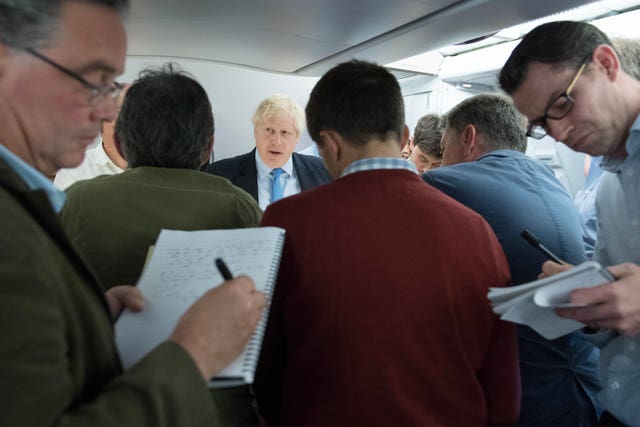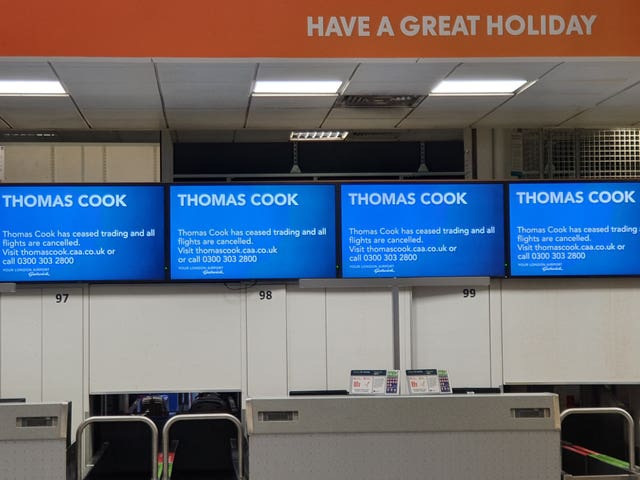
Boris Johnson has questioned whether directors should pay themselves “large sums of money” as their businesses go “down the tubes” following the demise of Thomas Cook.
The Prime Minister, who earlier defended the Government’s decision not to bail out the travel company, hinted at forcing companies to be properly insured against collapse.
Speaking to reporters in New York, Mr Johnson said: “I think the questions we’ve got to ask ourselves now: How can this thing be stopped from happening in the future?
“How can we make sure that tour operators take proper precautions with their business models where you don’t end up with a situation where the taxpayer, the state, is having to step in and bring people home?
“I have questions for one about whether it’s right that the directors, or whoever, the board, should pay themselves large sums when businesses can go down the tubes like that.”

Asked about sanctions on directors and tougher rules, the PM said: “I think that you need to have some system by which tour operators properly insure themselves against this kind of eventuality.”
He later tweeted a picture of him at the British Consulate in New York, saying: “Dropped in to meet officials in New York who are helping passengers and holidaymakers affected by Thomas Cook collapse. It’s a tough time for those who have had holidays disrupted but team hard at work to support them. Thanks to all the staff who represent our country so well.”
The Prime Minister earlier came under fire from Labour and the unions for failing to step in to save the collapsed tour operator.
But he warned that state intervention risked creating a “moral hazard” in future cases of companies on the brink.
“It is perfectly true that a request was made to the Government for a subvention of about £150 million,” the Prime Minister told reporters.
“Clearly that’s a lot of taxpayers’ money and sets up, as people will appreciate, a moral hazard in the case of future such commercial difficulties that companies face.”
Other ministers suggested the sum requested by Thomas Cook was up to £250 million.

Moral hazard is the concept that firms will take increased risks if they believe that they will be protected from the consequences, for example through a state bailout.
Downing Street said it was not the role of the Government to prop up failing companies in a competitive market.
“A bail-out would not have been a good use of taxpayers’ money. We would have had to repatriate people later down the line and have lost more money in the process,” a No 10 spokeswoman said.
“It is obviously a very competitive market and it isn’t the Government’s role to prop up companies when this sort of issue arises.
“Our decision was injecting cash into the situation was not going to make it any better.”
But shadow chancellor John McDonnell blamed the Tory Government’s “ideological bias” against state intervention for the decision not to intervene.
“The Government’s intervention could have enabled us to just stabilise the situation, give a breathing space so that there could be proper consultation with the workforce in particular about how to go forward,” he told the BBC.
“To just stand to one side and watch this number of jobs go and so many holidaymakers have their holiday ruined, I just don’t think that’s wise government.”
Very sadly Thomas Cook has collapsed. The biggest UK peacetime repatriation in history is underway. We will bring everyone home. An enormous task, there will be some delays, but we're working round the clock to do everything we can. Visit https://t.co/0wVHltRgqB for details.
— Grant Shapps MP (@grantshapps) September 23, 2019
Transport Secretary Grant Shapps said the repatriation operation would cost £100 million, less than the sum requested by Thomas Cook.
“The company were asking for up to £250 million, they needed about £900 million on top of that and they’ve got debts of £1.7 billion, so the idea of just spending taxpayers’ money on that just wasn’t really a goer,” he told ITV’s Good Morning Britain.


Comments: Our rules
We want our comments to be a lively and valuable part of our community - a place where readers can debate and engage with the most important local issues. The ability to comment on our stories is a privilege, not a right, however, and that privilege may be withdrawn if it is abused or misused.
Please report any comments that break our rules.
Read the rules here